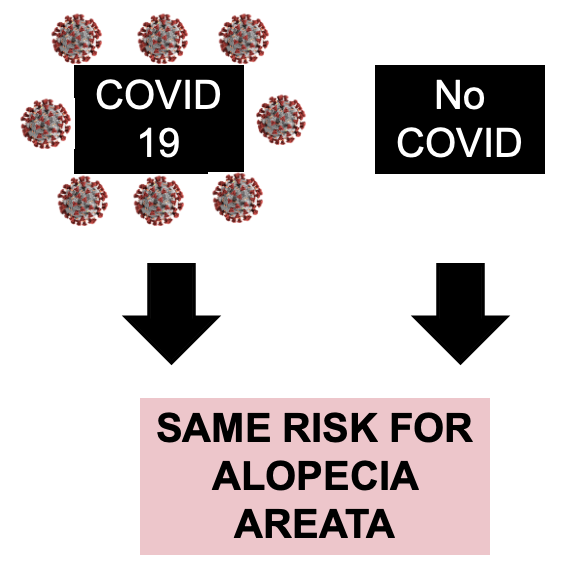Does COVID 19 cause alopecia areata?
New Onset Alopecia Areata After COVID19 : How Frequent is it?
There are occasional reports of alopecia areata developing after COVID 19. Many of the studies in the published medical literature that link alopecia areata and COVID 19 infection are not controlled and simply present patients who developed alopecia areata after infection. The timing of some of these stories is nevertheless fairly suggestive that alopecia areata can be influenced by COVID 19. The magnitude of true risk is not clear although it does seem that patients with a strong family history of patients with prior alopecia areata (in the past) are at greater risk than those without these histories.
Kim et al, 2021
The study by Kim and colleagues from South Korea is the largest and most meticulously done study so far in this area. The authors set out to evaluate the risk of developing alopecia areata. To do so the authors used a large data base to compare the risk of developing new onset alopecia areata in patients who acquired COVID 19 and the risk of developing new onset alopecia areata in patients who did not acquire COVID 19.
There were 226,737 individuals included in the study, including 7,958 [3.5%] cases and 218,779 [96.5%] controls). The ratio of newly diagnosed AA was 18/7,958 (0.2%) in cases and 195/218,779 (0.1%) in controls. . After adjusting for age and sex, there was no increased risk of COVID-19 patients having newly diagnosed AA compared to controls were 0.78 (95% CI: 0.48–1.27). There was also no increased risk when all demographic variables were adjusted 0.60 (95% CI: 0.35–1.03)
Conclusion:
Taken together, the authors concluded that a diagnosis COVID-19 was not significantly associated with the development of new onset AA even after appropriately adjusting for covariates.
REFERENCE
Kim et al. Lack of Evidence of COVID-19 Being a Risk Factor of Alopecia Areata: Results of a National Cohort Study in South Korea. Front Med (Lausanne) . 2021 Oct 13;8:758069.
This article was written by Dr. Jeff Donovan, a Canadian and US board certified dermatologist specializing exclusively in hair loss.

